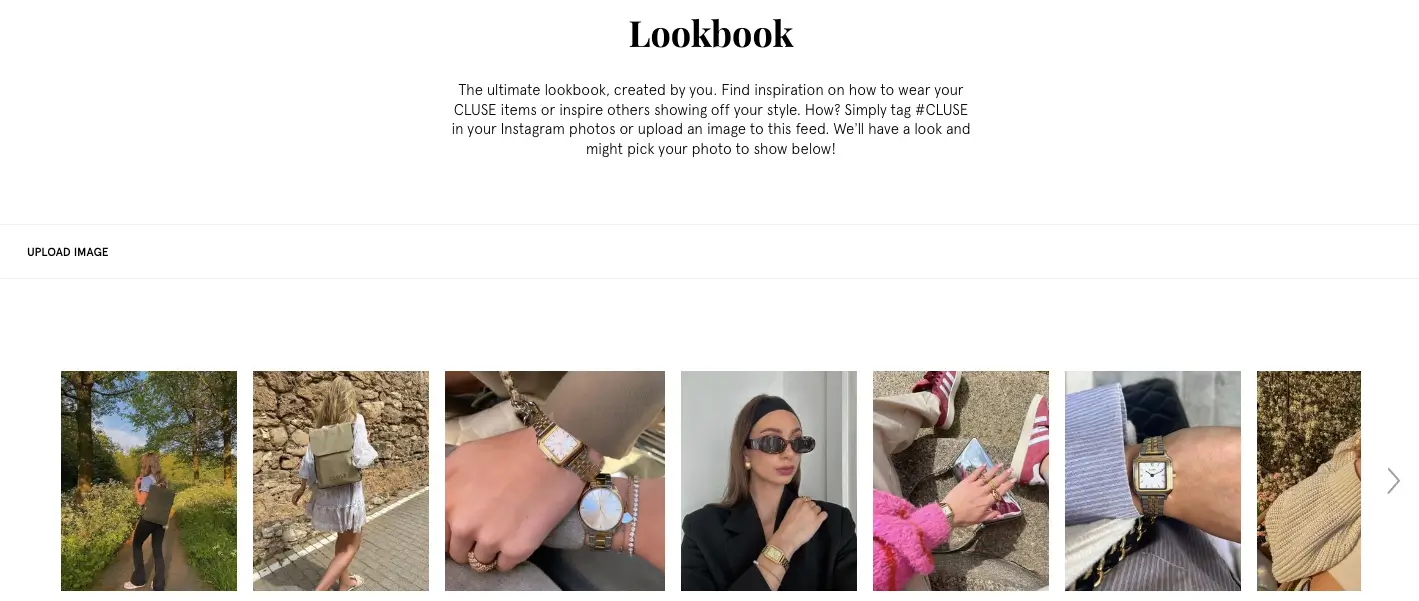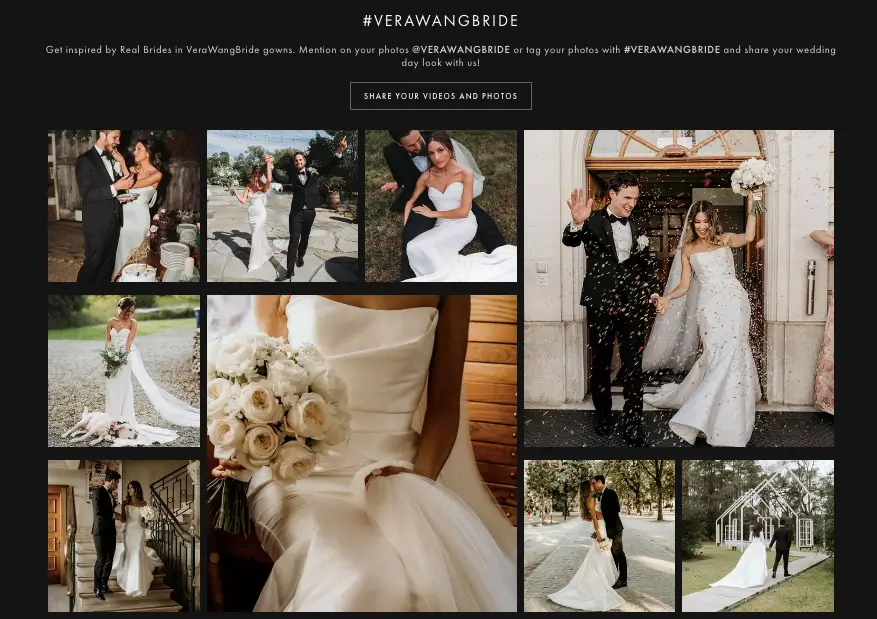Table of Contents
The benefits of user-generated content are endless. You might have heard about this winning strategy for your eCommerce and the possibilities that UGC brings. But what can user-generated content really do for your eCommerce brand?
User-generated content refers to any content created by a brand’s fans, customers, influencers, brand ambassadors, and wider audience. UGC can enhance the shopping journey and sell more products. It might take the form of pictures and videos shared on social channels, testimonials, reviews, tweets, blog posts, and more.
In this post, we share all of the benefits of user-generated content and how to leverage them to their full capacity in your user-generated content strategy.
User-generated content is everywhere right now. To stay on top of your competition, you should really consider incorporating it into your marketing strategy, as UGC and social purchases are the future of eCommerce retail.
83% of people say that Instagram helps discover new products, whereas 80% decide whether to make a purchase with the help of the popular social media platform.
Leveraging UGC in your eCommerce strategy can have enormous benefits for a number of reasons. Here are some of the most important benefits of user-generated content:
User-generated content derives its effectiveness from its inherent authenticity and credibility. Unlike traditional studio photography with professional models, UGC showcases real customers utilising products in genuine environments.
This authenticity resonates with potential buyers, as the content creators have independently invested in and experienced the products, lending substantial credibility to their demonstrations and testimonials.

Brands that run user-generated content campaigns are seen as authentic, meaning that customers trust them more. In fact, studies show that UGC can drive improved trust and loyalty for eCommerce brands, and 80% of respondents have said that UGC highly impacts their purchasing decisions.
And if 90% of customers check product reviews before purchase, UGC will help you reinforce the reliability and performance of your products. While 91% of shoppers are influenced to buy by social content, every brand out there is contending to be an influencer. Therefore, building trust with your target audience should be high on every brand’s list.
Shoppers have too many options to waste time on a brand that they don’t believe will deliver a consistent product. Make sure your customers know that when they buy something from you, they’re guaranteed a product that is trusted by previous customers.

People are already talking about you on social media. They’re already comparing products and listening to peer recommendations of what to buy. So why not harness all of this social proof, and use it to impress your shoppers? Learn how to create the perfect user-generated content campaign for your brand.
The authentic customer communication given by UGC can actually help to increase eCommerce revenue across all sectors.
Starting with fashion and apparel brands, jeans brand Salsa Jeans increased their conversion rates by 17.27% with UGC even during the height of the COVID-19 pandemic. By implementing UGC galleries within their online shopping journey, the brand brought in more online revenue by providing shoppers with real examples of how people style their products.

It’s the same for other industries, even furniture brands. By connecting user-generated content to products within their catalogue, furniture brand VOX saw an 18.76% increase in conversion rates thanks to UGC.

From footwear and cosmetics to consumer goods, fashion and apparel and more, online brands are benefiting from the conversion power of UGC. So, no matter your industry, the benefits of user-generated content are clear.
Maintaining consistent, high-quality content creation can be challenging, particularly for organisations with limited resources and personnel who must fulfil multiple roles simultaneously.
A strategic shift from content creation to content curation can significantly streamline your social media management process. By effectively leveraging user-generated content, organisations can optimise their content strategy while reducing internal resource demands.
And because UGC often ties directly into how brands communicate with customers across channels, G2’s guide on best customer communications management software, backed by insights from the G2 Grid Report, is a helpful resource for ensuring messaging, service workflows, and audience touchpoints remain consistent as engagement scales.
Implementing a robust customer content curation strategy offers several distinct advantages:
Furthermore, incorporating user-generated content into your social media strategy provides authentic, organic material that complements your branded content. These genuine customer interactions serve as valuable social proof while diversifying your content mix.
And not only that, but users are already creating this content. 80 million photos are uploaded daily to Instagram. And don’t forget the 30 billion pieces of content published to Facebook monthly. It’s already being generated, just learn how to curate it.
User-generated content not only drives revenue but also significantly enhances audience engagement. While conversion metrics remain a priority, monitoring consumer participation and brand community involvement is equally crucial. UGC demonstrates considerable potential to strengthen these engagement metrics.
For example, sporting goods brand Scicon Sports saw a 4.07% increase in conversion rates when implementing a UGC strategy with Flowbox.
UGC can be so much more than just a nice asset to have you on-site. It can also truly help customers understand how your products work in real-life situations and help people make decisions when they can’t hold the product in their hand.
Social proof represents a fundamental psychological principle in marketing strategy. User-generated content provides authentic validation of purchases, surpassing traditional marketing campaigns in effectiveness and credibility.
This method of verification proves particularly cost-effective, as customers naturally generate persuasive marketing materials through their interactions with products.
By implementing a robust UGC strategy, organisations establish a consistent flow of authentic content. This approach significantly reduces resource allocation for content creation, providing readily available and genuine content for your website.
UGC generates word-of-mouth. Digitising anecdotal recommendations does not fail, as more than 74% of consumers identify word-of-mouth as an important influence in their buying decisions.
This old-school method can substantially expand market reach and generate a large number of positive consumer feedback, ultimately driving revenue growth and market expansion.
The efficacy of UGC in improving conversion rates stems from its ability to provide tangible, visual evidence of product satisfaction. While traditional written reviews maintain their value, visual testimonials resonate more deeply with contemporary consumers, who are increasingly accustomed to visual-first social media platforms.
Visual galleries showcasing authentic customer experiences serve as powerful conversion tools, leveraging current digital consumption habits to maximise impact.
The empirical evidence supporting UGC’s effectiveness in eCommerce is substantial. We encourage businesses to implement this strategy promptly to optimise their digital presence and customer engagement.
The benefits of user-generated content speak for themselves. So don’t wait to start leveraging this strategy in your online store. Book a demo now to get in touch and find out how Flowbox can help.
While User Generated Content offers numerous advantages, it is essential to consider both its benefits and potential challenges. A comprehensive UGC strategy, supported by appropriate content management systems with Flowbox, can effectively address these considerations while maximising the positive impact on marketing efforts.
UGC is a double-edged sword. You have a lot of really good content coming in, meaning you will inevitably receive some spam. This is why curation and moderation tools are so important. A UGC Platform like Flowbox will help you to optimise your moderation efforts.
Obtaining proper legal permissions for user-generated content is essential. Organisations must secure rights to utilise third-party content on their digital platforms to maintain legal compliance.
Notably, users who actively engage with brand hashtags or tag companies in their content typically demonstrate a predisposition toward content-sharing permissions. Flowbox streamline the rights request process, ensuring proper compliance.
The truth is that it takes time to grow your audience and getting eCommerce customers to post about the brand on social media platforms can be a challenge, but receiving content that actually matches your brand image is harder.
Flowbox offers many tips on how to boost your flow of UGC, through contests to hashtag campaigns and how to activate your community.
Check out this expanded article on the pros and cons of user-generated content if you need more information on the topic.
Many brands hesitate to use UGC because they feel it doesn’t match their visual standards. Some of the most common objections include low-quality photos, off-brand messaging, or inconsistent aesthetics.
However, the reality is that UGC can be high-quality if brands provide the right structure and incentives. Here are five top tips to ensure high-quality UGC.
Flowbox has an impressive portfolio of brands that have already implemented UGC. Check this article to see a full list of user-generated content examples.
First up on our list is Cluse Watches, which uses a carousel-style UGC gallery to populate their “Lookbook” section. Shoppers can scroll through the pictures to see how Cluse’s customers have paired their watches with their outfits.

Upon clicking on a specific picture, there’s a direct link to the featured watch, making it extremely easy for the viewer to shop the look!
This implementation by Misako on their newsletter emails is a great example of how to activate your community in two ways, they activate them to tag the brand, wearing their new purchase whilst also giving an incentive of a discount whenever the customer does this.

Vera Wang Bride is a highly popular bridal fashion company. Working with Flowbox has enabled the brand to implement their user’s content onto a community page embedded in their website.

Your wedding dress is not an easy purchase to make, therefore implementing UGC was a revolutionary move for the brand, as it provides proof that Vera Wang Bride is a safe choice for your special day.
UGC can also be leveraged by not only industries that sell specific products but also those that sell experiences. Leisure and tourism company, VVV Ameland reaps the benefits of UGC by embedding Instagram feeds of their visitors who post pictures of beautiful sights during their holidays on the island.

This example features a stylish UGC gallery that matches the look and feel of this popular Dutch getaway. Adding a user-generated content gallery to the site gives prospective visitors the opportunity to get a real feel of the location and push them to book their holidays there.
Of course, navigating the massive marketing process that is UGC can be tough and new. This is why you should consider a social media aggregator like Flowbox to help grow your brand awareness and encourage purchases.
Flowbox enables you to connect and collect user-generated content from a huge variety of platforms, including Instagram, Facebook, TikTok, YouTube, Pinterest and more.
The collection, management, curation, and distribution of UGC require systematic moderation to maintain brand consistency. A dedicated UGC platform like Flowbox streamlines these operational processes, particularly when managing high-volume user engagement across social media channels.
Flowbox offers the Publish feature, an integrated social media scheduling tool that allows users to create, customise, schedule, and publish content directly to their social media accounts.
Managing user-generated content effectively requires a balanced approach to content review. As your brand’s hashtag grows in popularity, you’ll need a clear system to select the most impactful content that aligns with your marketing goals.
Content moderation is one of the most critical steps in any user-generated content marketing strategy. It helps you maintain your brand’s image while maximizing customer-created materials to choose content that truly represents your brand’s values and style.
The best way to ensure that you’re only collecting content that you want to use is with tools like Blacklisting and Whitelisting. These are two Flowbox features that allow your brand to block spam content while giving a green light to content from your collaborators and brand ambassadors.
From there, managing your content is easy. You just need to approve the images and videos that you’d like to appear on your eCommerce. You could even connect them with a product to make your customer content shoppable.
User-generated content has transformed from a marketing trend into an essential strategy for modern brands. By creating an environment that encourages authentic customer content creation, businesses can build trust, boost engagement, and drive conversions more effectively than ever before.
With platforms like Flowbox to streamline the process, implementing a successful UGC strategy has never been more accessible. Contact us and start experiencing the power of a UGC Platform today.